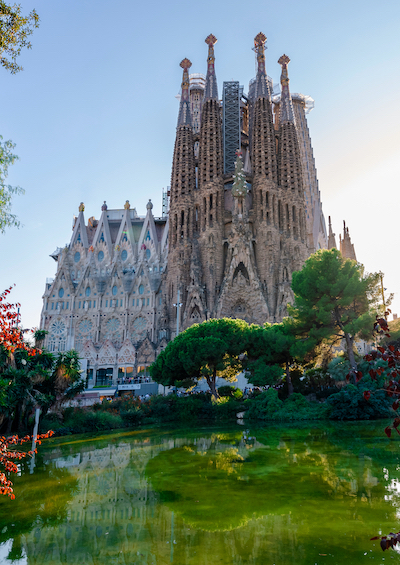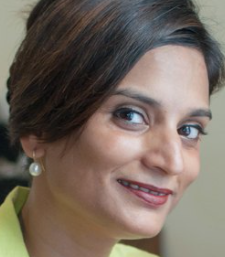Catching Religion at the Sagrada Familia
The confessions of an atheist.
January 8, 2022

I recently visited the, still incomplete, Sagrada Familia basilica in Barcelona. The front façade, which depicts the nativity, is a cross between theme park and rocket ship. The overall kinetic energy of the structure overwhelms the eye.
George Orwell famously called it, “one of the most hideous buildings in the world.” But although I can imagine it not being to everyone’s taste, I beg to differ. The Sagrada Familia is one of the few spaces in the world where I catch religion.
Architecture and spirituality
It is in the bones of cathedrals to soar. And for all its modernism, the Sagrada Familia shares the vertiginousness verticality of its medieval predecessors. Up, up, its ceilings go. Shafts of light colored by the stained glass illuminate the vast space like ethereal lasers.
It is impossible to lift your eyes up to the magnificence and not feel your soul rise in tandem.
This is the case, even if like me, you are not all that convinced about souls in general and about souls needing salvation, in particular.
The sacred in the atheist’s vocabulary
This basilica is a sacred space. It is bordering on blasphemous to remain unmoved by it. Were I feeling wretched and forsaken, I believe I would find solace being there.
But what do these words: sacred, profane, blasphemous, mean to someone who does not believe in God?
Being an atheist in India
It feels uncomfortable putting it so baldly for multiple reasons. To begin with, I come from an intransigently religious country, where religion is a condition, not an option.
You are born a Hindu and any individual protestation about unbelief is brushed aside as a childish tantrum. I remember telling an older family friend that I was an atheist a few years ago, to which he’d smiled indulgently and said, “Beta aisa nahin kahte” (“hush, child we don’t say things like that”).
Diwali
This social inability to be taken seriously as an unbeliever is complicated by the fact that I adore rituals, most of which are connected to religion.
The excitement of decorating the house with oil lamps and colored rice decorations in the lead up to Diwali was always worth the mild boredom of attending the prayers to Ganesh and Laxmi that accompanied the festivities.
I willingly folded my hands in front of the painted clay deities of these gods. I even enjoyed the wafting incense mingling with the scent of the offered flowers.
Eid and Christmas
I also looked forward to celebrating Eid with my Muslim neighbors because the food was delicious.
And Christmas was inevitably fun: the tree and presents. I even attended midnight mass on Christmas eve, whenever I could. It was exciting to stay up late and I liked the music of the call and answer of the prayers.
The importance of rituals
Do I believe in the Lord, God, Devatas, Allah? No. Do I believe they will make my wishes come true? No. Do I believe in heaven or hell or reincarnation. No.
But I do believe in rituals. They build solidarity, they are markers of identity. And they are performed on special occasions thereby transforming ordinary days into the special. They answer a human yearning for connection, celebration, giving thanks and beauty.
The belief of others
As a humanist, I understand the human need to reach for something beyond the known. I have empathy for the search for meaning and for faith, especially when there is nothing else left.
And so, while I do not personally have much truck with God, I am at ease with the belief of others. I will accommodate my behavior to that belief. I will cover my head if needed and fold my hands if asked to. I respect the religious customs of people because I respect people in general. This is tact in my book, not hypocrisy.
Weaponizing religion
What I am not at ease with is religion being used to disrespect those who do not share the same faith.
When belief is weaponized to exclude, to demand obedience in lieu of critical thinking or to hurt in any way, that belief becomes profane.
The secular sacred
So, back to what I mean when I use words like sacred and profane. How does someone secular deploy these terms?
The sacred for me is something that inspires awe. Most often it has to do with the kind of beauty – natural or manmade – that short circuits rational thought and packs a direct, emotional punch.
These are moments when your eyes fill with tears because you are moved, even before you have the words to express why this is so.
A listicle of the sacred
A random sample would include:
A thicket of cherry blossoms in bloom.
A morning raga.
Sunsets.
A flock of migrating cranes.
Little kids eating ice cream.
The silhouettes of distant mountains in shades of ink blue.
Puppies.
Silent spaces in crowded cities.
The Sagrada Familia.
What would you include on your list?
Takeaways
What do these words: sacred, profane, blasphemous, mean to someone who does not believe in God?
Do I believe in the Lord, God, Devatas, Allah? No. Do I believe they will make my wishes come true? No. Do I believe in heaven or hell or reincarnation. No.
I do believe in rituals. They build solidarity, they are markers of identity. And they are performed on special occasions thereby transforming ordinary days into the special. They answer a human yearning for connection, celebration, giving thanks and beauty.
As a humanist, I understand the human need to reach for something beyond the known. I have empathy for the search for meaning and for faith, especially when there is nothing else left.
while I do not personally have much truck with God, I am at ease with the belief of others. I will accommodate my behavior to that belief. I will cover my head if needed and fold my hands if asked to. I respect the religious customs of people because I respect people in general. This is tact in my book, not hypocrisy.
What I am not at ease with is religion being used to disrespect those who do not share the same faith.
When belief is weaponized to exclude, to demand obedience in lieu of critical thinking or to hurt in any way, that belief becomes profane.
The sacred for me is something that inspires awe. Most often it has to do with the kind of beauty – natural or manmade – that short circuits rational thought and packs a direct, emotional punch.

